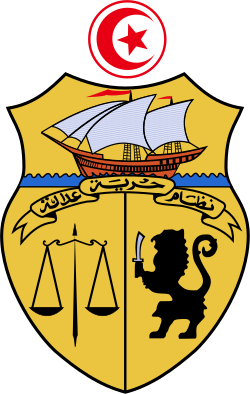Laarayedh Cabinet
Laarayedh Cabinet | |
|---|---|
Cabinet of Tunisia | |
 | |
| Date formed | 13 March 2013 |
| Date dissolved | 29 January 2014 (10 months and 16 days) |
| People and organisations | |
| Head of state | Moncef Marzouki (CPR) |
| Head of government | Ali Laarayedh (Ennahda) |
| Total no. of members | 38 (incl. Prime Minister) |
| Member parties | Ennahda, Ettakatol, CPR ("Troika") |
| Status in legislature | coalition government |
| Opposition parties | Nidaa Tounes, People's Movement, Popular Front, Al Joumhouri |
| History | |
| Election | 2011 Constituent Assembly election |
| Legislature term | Constituent Assembly (2011–2014) |
| Predecessor | Jebali Cabinet (2011–13) |
| Successor | Jomaa Cabinet (2014-15) |
 |
|---|
|
|
| |
The first cabinet of Tunisian Head of Government Ali Laarayedh was presented on 8 March 2013.[1] It was approved on 13 March 2013 by the Constituent Assembly of Tunisia.[2] Laarayedh resigned on 9 January 2014.[3] His successor, Mehdi Jomaa, took office on 29 January 2014.[4]
Cabinet members
[edit]The Laarayedh government consisted of the Prime Minister, three deputy prime ministers, 24 ministers and six state secretaries.[5]
| Office | Name | Party | |
|---|---|---|---|
| Head of Government | Ali Laarayedh | Ennahda | |
| Deputy Prime Minister | Noureddine Bhiri | Ennahda | |
| Deputy Prime Minister for Economy | Ridha Saidi | Ennahda | |
| Deputy Prime Minister for Governance and Fighting Corruption | Abderrahman Ladgham | Ettakatol | |
| Minister of Defence | Rachid Sabbagh | Independent | |
| Minister of Interior | Lotfi Ben Jeddou | Independent | |
| Minister of Foreign Affairs | Othman Jerandi | Independent | |
| Minister of Justice | Nadhir Ben Ammou | Independent | |
| Minister of Human Rights,Transitional Justice and Government Spokesperson | Samir Dilou | Ennahda | |
| Minister of Religious Affairs | Nourredine Khadmi | Independent | |
| Minister of Finance | Elyes Fakhfakh | Ettakatol | |
| Minister of Industry | Mehdi Jomaa | Independent | |
| Minister of Commerce and Craft industry | Abdelwaheb Maatar | CPR | |
| Minister of Tourism | Jamel Gamra | Independent | |
| Minister of Social Affairs | Khalil Zaouia | Ettakatol | |
| Minister of Education | Salem Labiadh | Independent | |
| Minister of Health | Abdellatif Mekki | Ennahda | |
| Minister of Development and International Cooperation | Lamine Doghri | Independent | |
| Minister of Vocational Training and Employment | Naoufel Jammali | Independent | |
| Minister of Transport | Abdelkarim Harouni | Ennahda | |
| Minister of Communication Technologies | Mongi Marzouk | Ennahda | |
| Minister of Equipment and Environment | Mohamed Salmane | Ennahda | |
| Minister of Youth and Sports | Tarak Dhiab | Independent | |
| Minister of Culture | Mehdi Mabrouk | Independent | |
| Minister of Women’s Affairs | Sihem Badi | CPR | |
| Minister of Higher Education and Scientific Research | Moncef Ben Salem | Ennahda | |
| Minister of State Domains and Land Affairs | Slim Ben Hamidene | CPR | |
| Minister of Agriculture | Mohamed Ben Salem | Ennahda | |
| Secretary of State for Regional Affairs and Local Authorities | Saïd Mechichi | Ettakatol | |
| Secretary of State for African and Arab Affairs | Leila Bahria | Independent | |
| Secretary of State for Immigration | Houcine Jaziri | Ennahda | |
| Secretary of State for Finance | Chedly Abed | Independent | |
| Secretary of State for Energy and Mines | Nidhal Ouerfelli | Independent | |
| Secretary of State for Agriculture | Habib Jemli | Independent | |
| Secretary of State for Regional Development | Noureddine Kaâbi | Independent | |
| Secretary of State for Youth and Sports | Fethi Touzri | Independent | |
| Secretary of State for Environment | Sadok Amri | Independent | |
| Secretary of State for Housing | Chahida Ben Fraj Bouraoui | Independent | |
References
[edit]- ^ "Prime Minister-Designate Names Members of New Cabinet". Tunisia Live. 8 March 2013. Archived from the original on 20 January 2014. Retrieved 11 November 2014.
- ^ "Tunisian lawmakers approve new government headed by Ennahda". Al Arabiya. 13 March 2013. Retrieved 10 January 2014.
- ^ "Tunisia's Islamist PM steps down as unrest mounts". Tunisia-Live. 9 January 2014. Retrieved 10 January 2014.
- ^ "Tunisia's new PM takes office after Islamists resign". Reuters. 10 January 2014. Retrieved 10 January 2014.
- ^ "La composition complète du gouvernement d'Ali Larayedh". Leaders. 8 March 2013. Archived from the original on 1 January 2014. Retrieved 11 November 2014.


 French
French Deutsch
Deutsch